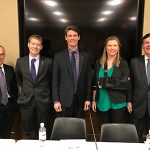Moderator Steve Smith, AF Volunteer, Commander, U.S. Navy (Retired)
The event’s moderator, retired U.S. Navy Commander and AF volunteer advocate Steve Smith, stressed that both arthritis funding and awareness need to be higher to have a positive impact on the health of both active service members and veterans.
“Arthritis funding is rather limited from year to year at the DoD. It’s critical that policymakers know that arthritis is the No. 1 cause of disability2 among our military veterans and that research to identify joint injury management techniques and slow progression of the disease will benefit everyone,” said Cmdr. Smith. “The impact on the DoD and Veterans Administration budgets, as a consequence of this disease, will only grow over the coming decades.”
There is an urgent need for better arthritis treatment for active duty troops, said Cmdr. Smith. “They deserve the best care available to ensure they can fulfill their mission and retire on their own terms, rather than letting a disease like arthritis take them out of service.” Because arthritis is so prevalent throughout the population, more research funding will ultimately benefit everyone, he added.
Panelist Bill Goulet, AF Volunteer, U.S. Navy Veteran
Fellow panelist Bill Goulet, an AF volunteer advocate and a U.S. Navy veteran, says he participated to help inform lawmakers, as well as new recruits and active military service members, about how to manage arthritis, including proper nutrition, exercise, training, equipment and treatment.
“As prevalent as it is, arthritis is a fairly silent, debilitating disease,” says Mr. Goulet. “I believe it is important to give it a voice and draw attention to the far-reaching negative aspects of arthritis and the lives it affects, both those afflicted, and their caregivers and families.”
More arthritis research funding in the DoD budget could support the study of new treatments and preventive interventions to improve quality of life for people in and after military service, he says.
“This should significantly reduce the financial burden of arthritis treatment after joints are damaged and worn out,” he says. “Hopefully, the result will be a stronger military, and reduced post-military service healthcare and financial burden.”
Ongoing Advocacy
While one high-profile event may have a strong impact on members of Congress, Dr. Edgerton encourages ACR and ARP members to engage in ongoing advocacy with their local and state lawmakers.
“ACR and ARP members are respected as leaders in their fields. With a shrinking rheumatology workforce, society depends on the ever smaller number of rheumatology voices for guidance on issues such as regulatory policy and legislation,” says Dr. Edgerton.3“Advocacy at each level—local community, state and national—is important in tackling issues at the appropriate stop, such as state legislature versus the halls of Congress, and also builds support for rheumatology causes.”

